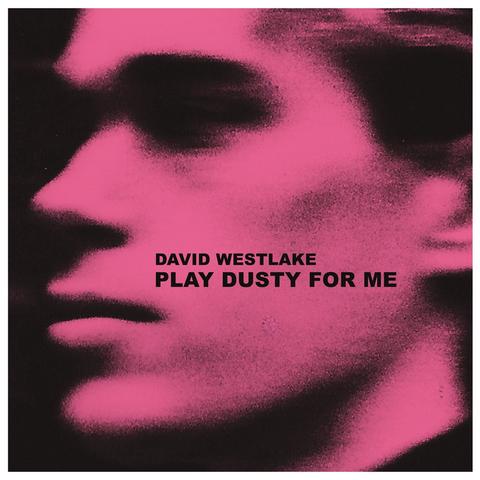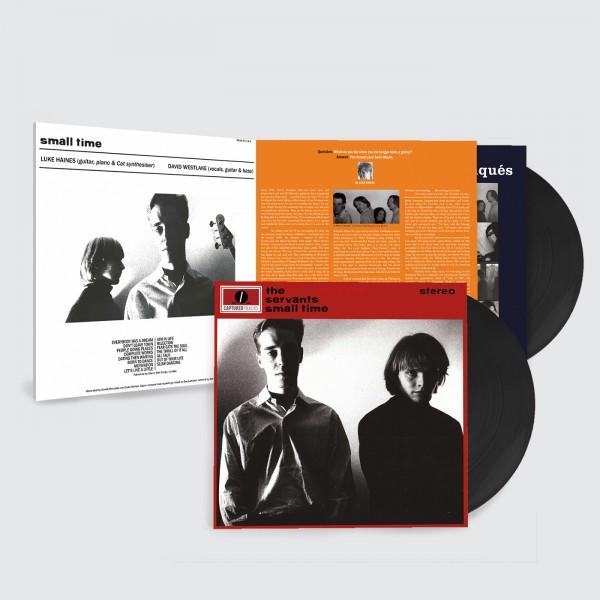
David Westlake
Artist Bio:
“Singer-songwriter David Westlake returns after a 10-year hiatus with a quiet but powerful set of songs – a kind of Lou Reed meets Dusty Springfield.” – MOJO
People who know and love David Westlake and his catalogue of terrific tunes usually come from one of three associations. First, his band The Servants were on 1986’s NME-associated C86 compilation. Second, the Servants was the original home of Luke Haines, leader of The Auteurs and Black Box Recorder. And third, as chronicled in an interview in The Big Takeover magazine, Belle & Sebastian front-man Stuart Murdoch was a huge Westlake fan, and tried to locate him in hope of forming a band with him before launching Belle in his school class instead.
Play Dusty For Me is David Westlake’s second solo LP, recorded in 2001. The first, 1987’s Westlake, was on Creation Records in its golden era. The Servants’ up-tempo, art-rock debut album Disinterest (1990) has long been out of print, and their second – Small Time, recorded in 1991 – had to wait until 2012 for release in a double-set with a collection of demos, Hey Hey We’re The Manqués. Play Dusty For Me is demonstrably an album put out for pure love rather than commercial gain. It was released, sort of, in a highly limited issue in 2002 that quickly sold out but was still never re-pressed. The Captured Tracks issue gives the album its first proper physical release. Available exclusively for 2015 Record Store Day “Black Friday” release, Play Dusty For Me is available in a limited edition of 500 LPs on black vinyl.
Store
– David Westlake Interview –
Was playing with the Go-Betweens on Janice Long your first time playing “solo”? How did you end up with them as your backing band?
Yes, first time. I had no real wish to be solo, but nor could I call it a Servants session. I was out on a limb at the time, not knowing if I would get to make another record. I knew I wanted to keep the Servants going. But the line-up I had in mid-’86 drifted apart the first time a label dropped the band. It became not uncommon for labels to drop bands after a modest-selling single or two, and a line-up can drift apart without a long-term connection or friendship to see them through uncertain times. A few months after, the BBC’s Janice Long got in touch about recording a session for her Radio One show. Janice liked “The Sun, A Small Star” – the recently released second Servants single. She had heard about the band getting dropped, and kindly wanted to help out. At first, I was going to turn down the session on account of not having a line-up at the time – politely decline. I said as much over a drink with Robert Forster of the Go-Betweens. He and Grant became friends the year before when we toured together. Robert said what a pity to turn down a BBC session, and rallied support.
How did it feel to have to release a solo album before releasing the actual debut by the Servants?
The chance to make a record and have it released is a privilege. I always remembered that. On a personal level, yes, I was ambivalent about it being solo when I was trying to continue with the band. I was working at putting together a full-time Servants line-up and searching at the same time for an opportunity to make another record. I knew if I waited for an ideal line-up I might never move forward. Luke Haines answered my NME ad in the second half of ’86. He was the first – ultimately, the only – person with whom everything clicked, artistically and personally. If I could have found a good and committed rhythm section at the same time I would have made the solo album a Servants record. But Martyn Casey and Alsy MacDonald of the Triffids were on it.
How did you end up with members of the Triffids as your backing band on the Westlake album?
Luke was always a joy to work with. He did fantastic work on the album, and it was great to do something live with him again in 2014. For the Westlake album, the label hired in the rhythm section – Martyn and Alsy – in the time-honoured pop/rock Nicky Hopkins tradition of using session musicians. They were top value – good and thoughtful players, lovely people. Martyn has long now been one of Nick Cave’s Bad Seeds, I think. Also involved was the son of fallen ’70s glam-rocker Gary Glitter. Paul Gadd Jr recorded a few of the songs and mixed the record’s opening track, “The Word Around Town”.
What did you do in-between Disinterest and Play Dusty?
Disinterest was released in 1990, and Play Dusty For Me originally in 2002. The first thing I did after Disinterest which it seems right to mention here is record the second Servants album, Small Time. Completed as a duo with Luke in 1991 but not released for more than twenty years – on Captured Tracks in America; on Cherry Red Records in England – the chronology can look confusing. We made overtures towards getting it released at the time. But, as Luke says elsewhere, we both knew – and suspected the other knew – while we were working on it that it would never come out. By 1991, I stopped making any attempt where the industry side of music was concerned. I never stopped writing, but I stopped approaching record companies. I stopped after receiving four rejections. Other people would send out demo after demo and think nothing of it, I know, but it went against the grain. I needed to get back to why I started writing and making music in the first place. Forget the industry side. Art for art’s sake. What else? I took degrees in Law and English literature, I completed a Ph.D. on Jacobean satire, and I became a solicitor, meanwhile teaching part-time at a nearby university. I cannot leave off the list that I met my soul-mate, Patsy. We married in 2014.
What inspired you to return to the studio and record the songs on this album? Who were you listening to at the time?
I was invited to play a few gigs in the late ’90s, which encouraged me to arrange some of the songs I had written for performance by a band. On a personal note, recording the album was therapeutic – bereavement inspired me to make the recording happen. I was helped out on Play Dusty For Me by some great musicians. My friend Dan Cross, who was in ’80s band Perfect Disaster. And Cormac Moore and his brother Willis on bass and drums. What was I listening to? John Lennon/Plastic Ono Band, Dusty in Memphis, and Klaus Tennstedt’s monumental twelve-disc box of Mahler’s symphonies, which I picked up secondhand for £40.
How did it end up being released by Mahlerphone? Did you have trouble finding a label to release it at the time?
I did not try finding a label to release Play Dusty For Me at the time. I had sworn off approaching record companies in 1991. Mahlerphone was me. Not too cryptically, I juxtaposed Mahler and Parlophone for the name. I listened to Mahler, and I lived around the corner from the old head-office and manufacturing plant of EMI/Parlophone. I pressed up a short-run of the album in 2002 at a duplication place called 10th Planet, off Oxford Street in London. My friend Del Sozou helped sell the CD online. I was surprised to find it went quickly. The album has not until now been properly physically released. I was lucky in 2006 to have a label search me out. Cherry Red Records contacted me and the result was a Servants CD compilation, Reserved. Then Mike at Captured Tracks got in touch, which led to a couple of Servants vinyl releases: first, the Youth Club Disco compilation; then the second-album double-set Small Time / Hey Hey We’re The Manqués. Having had reason to become disenchanted with record companies up to 1991, Cherry Red and Captured Tracks restored long-lost faith.
A year after the record came out Stuart Murdoch told The Big Takeover that before he started Belle and Sebastian he was trying to find you so you could start a band together. Were you aware of that at the time?
No, I was not aware. Before computers and the internet became ubiquitous, people could successfully disappear, and, if they wanted to, remain quite unreachable. It’s a real privilege to receive a retrospective mention, of course.
Do you have any plans for recording in the future?
Yes, I would like to make another album. I would invite the musicians who joined me for the NME C86 show in 2014 to play on it if they are able and willing – again, guitar-great Dan Cross, dear friend Des Lambert on bass, and Rob Flanagan on drums. It makes such a difference to have Captured Tracks release Play Dusty For Me. I kept putting off recording again after making it because the prospect of seeing something properly physically released seemed remote. And digital is a pale substitute for the artefact – for me, at least. Having Play Dusty authentically available at last is a spur to action.



